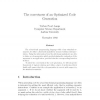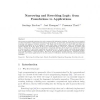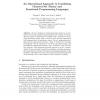198 search results - page 11 / 40 » Time Equations for Lazy Functional (Logic) Languages |
PLANX
2007
13 years 9 months ago
2007
Although monadic second-order logic (MSO) has been a foundation of XML queries, little work has attempted to take MSO formulae themselves as a programming construct. Indeed, MSO f...
LFP
1990
13 years 9 months ago
1990
PCF, as considered in this paper, is a lazy typed lambda calculus with functions, pairing, fixed-point operators and arbitrary algebraic data types. The natural equational axioms ...
PEPM
1993
ACM
13 years 12 months ago
1993
ACM
For a functional programming language with a lazy standard semantics, we define a strictness analysis by means of abstract interpretation. Using the information from the strictne...
ENTCS
2007
13 years 7 months ago
2007
Narrowing was originally introduced to solve equational E-unification problems. It has also been recognized as a key mechanism to unify functional and logic programming. In both ...
TACS
1994
Springer
13 years 12 months ago
1994
Springer
Abstract. We have designed a programming logic based on an integration of functional programming languages with classical set theory. The logic merges a classical view of equality ...



